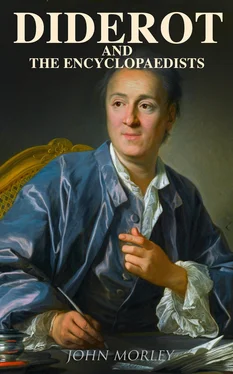In the seventh volume an article appeared which made the ferment angrier than it had ever been. D'Alembert had lately been the guest of Voltaire at Ferney, whence he had made frequent visits to Geneva. In his intercourse with the ministers of that famous city, he came to the conclusion that their religious opinions were really Socinian, and when he wrote the article on Geneva he stated this. He stated it in such a way as to make their heterodox opinions a credit to Genevese pastors, because he associated disbelief in the divinity of Jesus Christ, in mysteries of faith, and in eternal punishment, with a practical life of admirable simplicity, purity, and tolerance. Each line of this eulogy on the Socinian preachers of Geneva, veiled a burning and contemptuous reproach against the cruel and darkened spirit of the churchmen in France. Jesuit and Jansenist, loose abbès and debauched prelates, felt the quivering of the arrow in the quick, as they read that the morals of the Genevese pastors were exemplary; that they did not pass their lives in furious disputes upon unintelligible points; that they brought no indecent and persecuting accusation against one another before the civil magistrate. There was gall and wormwood to the orthodox bigot in the harmless statement that "Hell, which is one of the principal articles of our belief, has ceased to be one with many of the ministers of Geneva; it would be, according to them, a great insult to the divinity, to imagine that this Being, so full of justice and goodness, is capable of punishing our faults by an eternity of torment: they explain in as good a sense as they can the formal passages of Scripture which are contrary to their opinion, declaring that we ought never in the sacred books to take anything literally, that seems to wound humanity and reason." And we may be sure that D'Alembert was thinking less of the consistory and the great council of Geneva, than of the priests and the parliament of Paris, when he praised the Protestant pastors, not only for their tolerance, but for confining themselves within their proper functions, and for being the first to set an example of submission to the magistrates and the laws. The intention of this elaborate and, reasoned account of the creed and practice of a handful of preachers in a heretical town, could not be mistaken by those at whom it was directed. It produced in the black ranks of official orthodoxy fully as angry a shock as its writer could have designed.
The church had not yet, we must remember, borrowed the principles of humanity and tolerance from atheists. It was not the comparatively purified Christian doctrine of our own time with which the Encyclopædists did battle, but an organised corporation, with exceptional tribunals, with special material privileges, with dungeons and chains at their disposal. We have to realise that official religion was then a strange union of Byzantine decrepitude, with the energetic ferocity of the Holy Office. Within five years of this indirect plea of D'Alembert for tolerance and humanity, Calas was murdered by the orthodoxy of Toulouse. Nearly ten years later (1766), we find Lewis XV., with the steam of the Parc aux Cerfs about him, rewarded by the loyal acclamations of a Parisian crowd, for descending from his carriage as a priest passed bearing the sacrament, and prostrating himself in the mud before the holy symbol.[138] In the same year the youth La Barre was first tortured, then beheaded, then burnt, for some presumed disrespect to the same holy symbol—then become the hateful ensign of human degradation, of fanatical cruelty, of rancorous superstition. Yet I should be sorry to be unjust. It is to be said that even in these bad days when religion meant cruelty and cabal, the one or two men who boldly withstood to the face the king and the Pompadour for the vileness of their lives, were priests of the church.
D'Alembert's article hardly goes beyond what to us seem the axioms of all men of sense. We must remember the time. Even members of the philosophic party itself, like Grimm, thought the article misplaced and hardy.[139] The Genevese ministers indignantly repudiated the compliment of Socinianism, and the eulogy of being rather less irrational than their neighbours. Voltaire read and read again with delight, and plied the writer with reiterated exhortations in every key, not to allow himself to be driven from the great work by the raging of the heathen and the vain imaginings of the people.[140]
While the storm seemed to be at its height, an incident occurred which let loose a new flood of violent passion. Helvétius published that memorable book in which he was thought to have told all the world its own secret. His De l'Esprit came out in 1758.[141] It provoked a general insurrection of public opinion. The devout and the heedless agreed in denouncing it as scandalous, licentious, impious, and pregnant with peril. The philosophic party felt that their ally had dealt a sore blow to liberty of thought and the free expression of opinion. "Philosophy," said Grimm, by philosophy, as I have said, meaning Liberalism, "will long feel the effect of the rising of opinion which this author has caused by his book; and for having described too freely a morality that is bad and false in itself, M. Helvétius will have to reproach himself with all the restraints that are now sure to be imposed on the few men of lofty genius who still are left to us, whose destiny was to enlighten their fellows, and to spread truth over the earth."[142]
At the beginning of 1759 the procureur-général laid an information before the court against Helvétius's book, against half a dozen minor publications, and finally against the Encyclopædia. The De l'Esprit was alleged to be a mere abridgment of the Encyclopædia, and the Encyclopædia was denounced as being the opprobrium of the nation by its impious maxims and its hostility to morals and religion. The court appointed nine commissaries to examine the seven volumes, suspending their further sale or delivery in the meanwhile. When the commissaries sent in their report a month later, the parliament was dissatisfied with its tenour, and appointed four new examiners, two of them being theologians and two of them lawyers. Before the new censors had time to do their work, the Council of State interposed with an arbitrary decree (March 1759) suppressing the privilege which had been conceded in 1746; prohibiting the sale of the seven volumes already printed, and the printing of any future volumes under pain of exemplary punishment.[143] The motive for this intervention has never been made plain. One view is that the king's government resented the action of the law courts, and that the royal decree was only an episode in the quarrel then raging between the crown and the parliaments. Another opinion is that Malesherbes or
Choiseul was anxious to please the dauphin and the Jesuit party at Versailles. The most probable explanation is that the authorities were eager to silence one at least of the three elements of opposition, the Jansenists, the lawyers, and the philosophers—who were then distracting the realm. The two former were beyond their direct reach. They threw themselves upon the foe who happened to be most accessible.
The government, however, had no intention of finally exterminating an enemy who might at some future day happen to be a convenient ally. They encouraged or repressed the philosophers according to the political calculations of the moment, sometimes according to the caprices of the king's mistress, or even a minister's mistress. When the clergy braved the royal authority, the hardiest productions were received with indulgence. If the government were reduced to satisfy the clergy, then even the very commonplaces of the new philosophy became ground for accusation. The Encyclopædia was naturally exposed in a special degree to such alternations of favour and suspicion.[144] The crisis of 1759 furnishes a curious illustration of this. As we have seen, in the spring of that year the privilege was withdrawn from the four associated booksellers, and the continuance of the work strictly prohibited. Yet the printing was not suspended for a week. Fifty compositors were busily setting up a book which the ordinance of the government had decisively forbidden under heavy penalties.
Читать дальше












